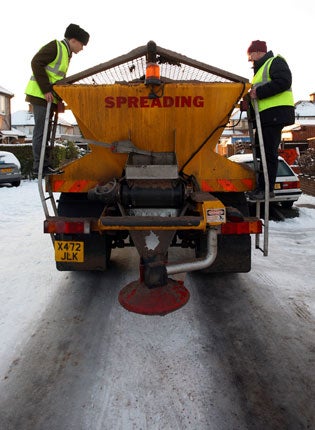Kevin Rawlinson: It takes true grit to keep the roads safe

Cold to the bone, tired, miserable, sprayed with gravel and roundly abused by the public for the slippery, potholed state of Britain's paths and roads – welcome to life as a gritter.
"People seem to think that there should be an army of people dedicated to gritting their driveways, that there are people whose sole job it is to grit the roads," said 62-year-old Bob Condon, as we rumbled through the streets of Middlesex in a bright orange beast spitting out brown salt. "But we all do this on top of our normal jobs at the council."
As he shows me the difference between the hopper and the spinner – quite fundamental, it turns out – Mr Condon, who lives with his wife Jo in Watford, explains he has been made redundant "countless times", which has made him appreciate the two extra shifts a day at this time of year.
This gritter's day begins at 4am, when he gets up to commute into London and grit his small section of the capital's roads. After finishing one shift, his "proper day" begins. Then back out to Hillingdon in Middlesex, where normally, he services Hillingdon Borough Council's vehicles. On days when he is gritting, they let him go home early – around 2pm – for some sleep before coming back for his third shift of the day, gritting the roads ready for the next morning. "My wife doesn't like it," he says. "But it pays for the annual holiday.
"It is not what you would call an enjoyable job. But I do get a sense of satisfaction knowing that I am helping people. My ex-wife was involved in a car crash when she slipped on black ice recently. If I can help prevent that happening to more people, that is satisfying."
Jonathan Westell, who co-ordinates the gritting team, says that the council aims to grit around 40 per cent of most important roads – they do not have the resources to do more. "We aim so that everyone only has a minimal journey before they get to a gritted road. We have gone through 1,900 tonnes of grit since the cold weather started.
"We bought in what would normally have been enough, now it is a case of resupplying and continuing to grit the roads which need it."
Join our commenting forum
Join thought-provoking conversations, follow other Independent readers and see their replies
Comments
Bookmark popover
Removed from bookmarks